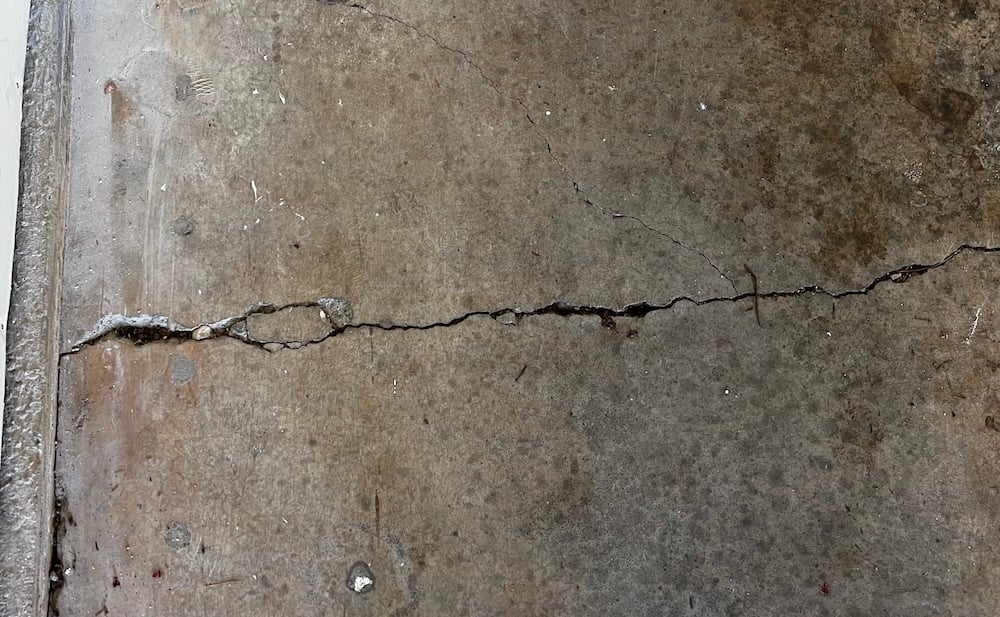Topics:
Search for topics or resources
Enter your search below and hit enter or click the search icon.
Providing your email address will keep you updated should we need to provide updates specific to your location.

While some cracks point to bigger structural problems, many are simply the result of natural concrete movement.
At A-1 Concrete Leveling, we’ve spent over 30 years repairing and leveling garage floors across the country. Here’s our complete guide to why cracks form, how to diagnose them, how to prevent new ones, and the best repair methods.
TL;DR
Garage floor cracks happen due to natural expansion and contraction, poor joint placement, or slab settling. Hairline cracks are usually cosmetic, but widening or uneven cracks should be repaired to prevent water damage, freeze-thaw deterioration, and slab movement. The best repair choice depends on your goal: epoxy and polyurea for reinforcement, flexible polymer caulk for sealing.
In This Article
Garage floor cracks usually come down to two main causes:
Concrete naturally expands in hot weather and contracts in cold weather. Without enough expansion joints and control joints, your garage floor will eventually crack in unpredictable places.
If these joints are missing, too few, or poorly placed, cracks often appear much sooner.
Over time, the ground beneath your garage can shift. Common causes include:
When the base moves, the concrete above shifts and cracks. Concrete leveling can fill voids and lift slabs back into place before cracks spread.
Not every crack is cause for immediate concern, but it’s important to know when to take action.
Pro Tip: Mark each crack and measure every few months. Any noticeable change means it’s time to repair and/or seek a professional opinion.
Related Resource: 11 Types of Concrete Cracks and What They Mean
While you can’t prevent all cracks, you can reduce the risk with proactive steps.

Garage floors have smooth finishes, so matching the repair to the surrounding surface can be challenging. The main repair materials each serve a different purpose.
Epoxy crack filler is a two-part resin that cures into a rigid, strong fill.
Polyurea repair liquid is a two-part, semi-rigid material that bonds deeply with concrete.
Concrete caulk is a flexible, water-resistant sealant designed to hold up to slab movement.
| Feature | Epoxy Crack Filler | Polyurea Repair Liquid | Flexible Polymer Caulk |
|---|---|---|---|
|
Strength |
High – reinforces crack |
High – strengthens and bonds |
Low – seals but doesn’t reinforce |
|
Flexibility |
Low – rigid when cured |
Medium – semi-rigid |
High – moves with concrete |
|
Finish |
Sandable, smooth |
Smooth |
Flexible bead, visible line |
|
Best Use |
Pre-coating prep, structural reinforcement |
Heavy-duty repairs, spalled joint fixing |
Sealing to prevent water intrusion and friction |
|
DIY Friendly |
Moderate difficulty |
Low – best for pros |
High – good for DIYers |
Ignoring cracks lets water, friction, and freeze-thaw cycles accelerate damage. Whether you want to seal garage cracks today or lift and level a settling slab, A-1 Concrete Leveling can help.
Request your free estimate today to keep your garage floor safe, strong, and looking its best.
No, not all garage floor cracks are bad. Many are cosmetic, but widening or uneven cracks can indicate settlement and should be repaired.
Flexible polymer caulk is the quickest and easiest option for sealing small cracks.
Sealing helps slow deterioration by blocking water intrusion and friction, but it won’t stop movement from underlying settlement.
DIY works for small cracks, although it can be hard to match the smooth garage floor texture. Professionals are best for large, uneven, or active cracks.
Sarah Etler joined A-1 Concrete Leveling after receiving her Bachelor of Arts degree in English from Northern Kentucky University. As A-1's Content Marketing Manager, she works closely with industry experts to produce content that will best answer questions related to concrete repair and maintenance practices. Sarah loves living a life full of discovery and is excited every day to see what new things she can learn and share with those around her.
Topics: